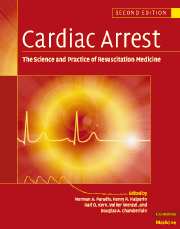Book contents
- Frontmatter
- Contents
- List of contributors
- Foreword
- Preface
- Part I Introduction
- Part II Basic science
- Part III The pathophysiology of global ischemia and reperfusion
- Part IV Therapy of sudden death
- Part V Postresuscitation disease and its care
- Part VI Special resuscitation circumstances
- Part VII Special issues in resuscitation
- 66 The ethics of resuscitation and end of life decisions
- 67 The economics of treating sudden cardiac arrest
- 68 Medicolegal aspects
- 69 The near-death experience, long-term psychological outcomes and support of survivors
- 70 CPR training
- 71 Consensus development in resuscitation: the growing movement towards international emergency cardiovascular care guidelines
- Index
67 - The economics of treating sudden cardiac arrest
from Part VII - Special issues in resuscitation
Published online by Cambridge University Press: 06 January 2010
- Frontmatter
- Contents
- List of contributors
- Foreword
- Preface
- Part I Introduction
- Part II Basic science
- Part III The pathophysiology of global ischemia and reperfusion
- Part IV Therapy of sudden death
- Part V Postresuscitation disease and its care
- Part VI Special resuscitation circumstances
- Part VII Special issues in resuscitation
- 66 The ethics of resuscitation and end of life decisions
- 67 The economics of treating sudden cardiac arrest
- 68 Medicolegal aspects
- 69 The near-death experience, long-term psychological outcomes and support of survivors
- 70 CPR training
- 71 Consensus development in resuscitation: the growing movement towards international emergency cardiovascular care guidelines
- Index
Summary
Introduction Each year, about 360 000 of about 2.4 million deaths in the USA are caused by sudden cardiac arrest (SCA). Any other cause of death that gives rise to mortality on such a scale (about 15% of all deaths) has seen huge research funding and effort, and funding devoted to finding the cause and successful treatment of the condition. Although much is now known about the cause of sudden cardiac episodes, efforts to apply successful treatment have not received the funding that could be expected of such a large cause of death.
The two main reasons for this are the speed and near-certainty of death. The speed of onset of the condition requires an exceedingly fast response. Successful treatment is available, but it must be applied quickly. Increasing the speed of response of emergency medical services is expensive, and this dominates in the estimation of cost-effectiveness. A fundamental but unresolved question is the extent to which it is worth providing a swift response, and the circumstances in which a society or a health service provider is willing to divert resources from other disease areas, given the uncertainty surrounding the value of the benefits of adding resources to improve the likelihood of success of the treatment. The second reason for the lack of resources is the near certainty of death when the condition strikes. There are relatively few survivors: in most countries, no more than 5% of patients leave hospital alive. Hence, there are few patient support groups to provide a higher profile and act as a lobby group for more effective treatment.
- Type
- Chapter
- Information
- Cardiac ArrestThe Science and Practice of Resuscitation Medicine, pp. 1212 - 1225Publisher: Cambridge University PressPrint publication year: 2007



